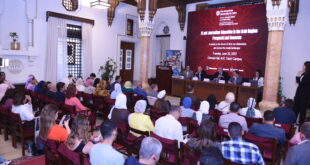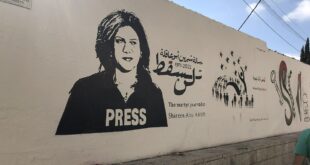Cambridge Arab Media Project: The Media and Political Change in the Arab World, 29-30 September 2004
Thank you very much. I am actually very proud to talk after Dr. Saad Eddin Ibrahim, who is one of those people who inspired our thoughts when we were students--political science students at Cairo University. As a professor of political sociology, I salute Dr. Ibrahim for his analysis because what he presented was an idea about Arab society since we started talking about media actually more than half a century ago.
Now as a media person, I am trying to take you through the jigsaw of the Arab broadcasting industry. I am an eye-witness to what Dr. Ibrahim described as the "revolution of the Arab satellite industry" because I was one of those who was taken from London to Doha to establish Al Jazeera more than seven years ago.
We need first to talk about why we are talking about satellite channels in the first place. I totally agree with Dr. Ibrahim. Yes, satellite channels helped us to become more aware. Yes, satellite channels raised the level of awareness, raised the level of freedom of speech. But I am quoting one of the security guys I met in Cairo during the arrest of Dr. Ibrahim and who mentioned to me, "We couldn't arrest Dr. Ibrahim because you would know it was a political reason--because it would be a scandal. We had to wait until we caught something. We needed to fabricate something against him to catch him without having any scandal."
I think, thanks to satellite channels, thanks to the media, Dr. Ibrahim was not arrested because of his opinions, but at the end of the day he was arrested. That is the core of my response.
Where is the change? We are trying to catch the change. There is change in behaviours but there is no change in the political scene. My argument is that if you start looking--especially after September 11--at the Arab regimes from Morocco and Mauritania to Bahrain and even Qatar, what happened after September 11 is a deterioration of political reform, not a moving ahead. And if we were looking even before, since the rise of Al Jazeera we need to differentiate between the reasons and the results.
The existence of the satellite channels is the result of a move started after the first Gulf war. In my analysis, Arab leaders-including the Qatari government-realized the importance of freeing the media. . . . . And because of the dispute Dr. Ibrahim mentioned between Saudi Arabia and Qatar, the Qatari government chose the name "Al Jazeera"--The Peninsula--which for four decades was monopolized by the Saudis. If you were talking of "Al Jazeera" before 1996, for sure you were referring to something in Saudi Arabia.
Does it make any change, political change? Political reform means change. Change in dealing with oppositional figures such as Sa'ad Eddin Ibrahim, dealing with public opinion. Yes, there is some transparency, more transparency in the information process. With the appearance of satellite channels, we are witnessing some transparency. But as a person who was very involved in the satellite industry in Abu Dhabi, in Al Jazeera, and now in the BBC, transparency of information doesn't necessarily mean lead to rational and political decisions at the end of the day.
Political regimes avoid scandals by telling truth rather than waiting for the truth to be announced by satellite channels. But at the same time they are telling the truth. It is now a tool of propaganda. They are using the satellite channels as a tool of propaganda. Politicians--if we widen the expression and the definition of a politician, we had politicians ruling our societies and we had politician opposing the governments and we had politicians like Osama bin Laden opposing the international regime--but all of them are using and sometimes misusing the satellite channels. We are proud of our channels. These channels need to be aware that there is a difference between raising awareness and making change.
The second distinction we need to make is to differentiate between the policies of these satellite channels and the attitude of people who are working in these satellite channels. We have some in attendance at this conference who are programme makers, producers, and announcers, and they can correct me if I am wrong.
The policies of the satellite channels are not as precise and obvious as you may think as academics. The policies are not written; they are very flexible. Most of them depend on the policy of the country funding the channel. And even the country which is funding the channel does not want to make it very clear and obvious. They like to be flexible.
I remember when President Mubarak had this health problem in parliament and I was editor-in-chief of Al Jazeera. I covered it thoroughly. I had to bring somebody to comment on why the political regime in Egypt is so fragile that people were so worried about the future of Egypt because one man had these problems.
And of course these comments didn't please the authorities in Egypt. They started talking to everybody in our channel, including the chairman of the board. We had to balance it by bringing in somebody--I don't want to mention his name--but at the end of the day, balancing the view; this was not necessarily needed because the view itself is imposed by the Egyptian government that they did not have an alternative. People in the streets were worried for the future of their society and to balance that we needed to discuss the future of constitutional reform in Egypt. At the end of the day, if we needed to "balance" by bringing in someone to defend the regime 100 percent, these channels at the end of the day are misused and the reason for this is that the policies of the owners are not clear. But the behaviour of the producers is different.
Sometimes you think: Al Jazeera, or Al Arabiya or Abu Dhabi, they have a plan, they have a conspiracy theory. They have an attitude towards the Palestinian cause or towards the Israeli occupation of Palestine or towards the Iraqi problem. There is no such clear plan or policy. It totally depends on the producer who is making the program; sometimes a person can change the whole policy of the channel--just by chance!
. . . .
We need to differentiate between some other things too. We need to differentiate between competition and professionalism. Dr. Ibrahim rightly talked about raising the level of professionalism in the Arab satellite channels. Yes. Why? Again why?
We need to differentiate between result and cause. The cause in most cases, even in some established channels like Al Arabiya, was competition. And I witnessed another thing. I witnessed the rise of news channels in Abu Dhabi. My colleague Jasim al-Azzawi witnessed it too, and he can correct me if I am wrong. When we started putting in more news about Abu Dhabi it was because of competition. It was not because of political awareness of the founders and the founders saying, "We need to change, we need to inspire change!" No! It was because of the competition.
Al Arabiya started its transmission because of competition. We need to look carefully at why the satellite channels rushed to interview Dr. Ibrahim after he was released. It was not because they believed he should be interviewed, it was because mainly because of competition. People are trying to compete with each other by raising the level of professionalism. . . . . But we need to be aware of whether the competition is driving us or we are driving the competition? We need to look thoroughly at whether the financial side drives us as media or we are driving it? Are we using competition, technology, money, or are we used by technology, competition, and money?
This is a very crucial question because I don't believe a lot in objectivity on the Arab satellites. Sometimes as editor-in-chief of Al Jazeera, I had to go live because Al Arabiya went live and if I didn't I would be blamed. I have some cases when I did it intentionally. I remember the "Gulf Summit" in Kuwait just before I resigned. I did it intentionally, I did not go for "live" and I didn't transmit it live because I didn't believe there was something important to be broadcasted in the opening session of the Gulf Summit, but everybody transmitted live, just because of competition, not because of anything else.
So we need to look thoroughly at the difference between professionalism and competition.
I would like to give a funny example. Do you remember this play? It was by a Tunisian actress. The story was a funny one: they believed in the freedom of speech invoked by Al Jazeera, and in the story some Tunisians--young Arab men--went to Qatar to express their opinions because Qatar is an open country. I am not here to criticise Qatar. I criticize all Arab society. In the story, they were prevented from entering Qatar because they didn't have visas and they started shouting in the Qatari airport: "Here is Al Jazeera! Why are you preventing us? We believe in freedom and you believe in freedom. You should allow us … we are Arabs!' but at the end of the day Al Jazeera and Al Arabiya and this rise of satellite channels and freedom of speech didn't change the situation on the ground. The political situation is still as it was fifteen years ago. The only difference--and I salute the conference because it touched on this from the beginning--the only difference is that anger is now being vented through the satellite channels, and this is a very risky phenomenon. We need to be aware of it. Thank you very much.
 Arab Media & Society The Arab Media Hub
Arab Media & Society The Arab Media Hub




